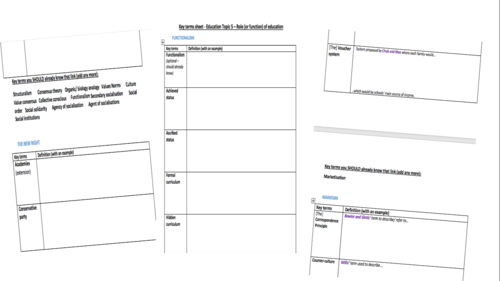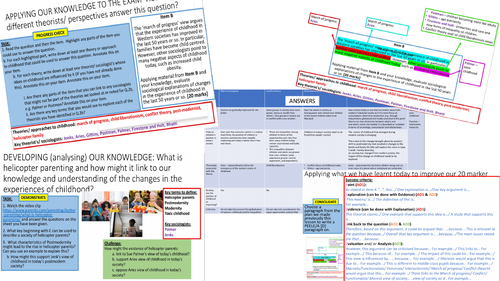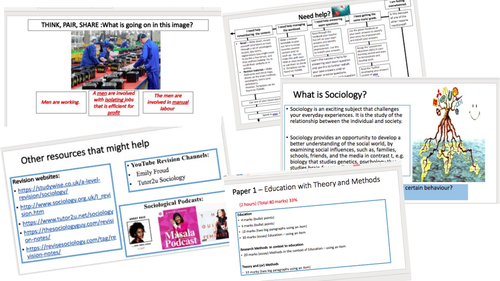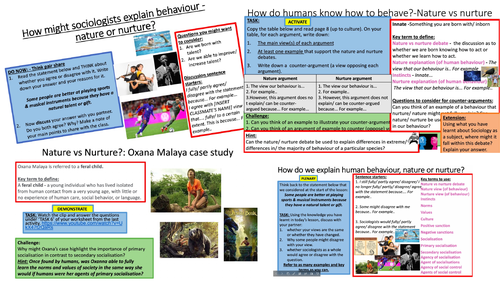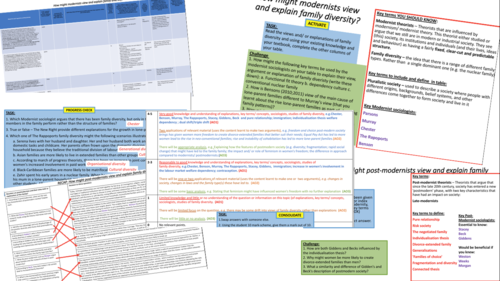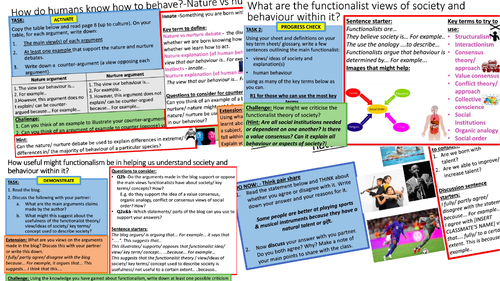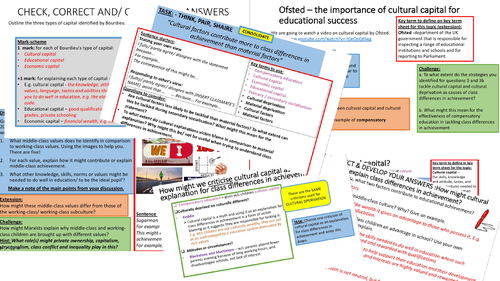
153Uploads
20k+Views
4k+Downloads
Sociology

AQA A-level Sociology Education Topic 5 Role of education - Functionalist view
Detailed student led lesson on functionalist views of the role of education adapted to stretch and challenge the most able whilst scaffolding to allow pupils who need support the opportunity to access higher level thinking.
Covers the following functionalist key functions of education: installing social solidarity, bridging the gap between the family and wider society through secondary socialisation, teaching specialist skills needed for work and role allocation.
Covers the following functionalist sociologists: Durkheim, Parsons and Davis and Moore.
Covers the following key term:
Function or role (e.g. of an institution)
Social solidarity
Formal curriculum
Hidden curriculum
Ascribed status
Achieved status
Universalistic standards
Particularistic standards
Meritocracy
Socialisation
Role allocation
Promotes a spiral curriculum by making links to key terms that students might have previously been taught that link to this lesson.
Promotes, facilitates and scaffolds Oracy.
Develops the skills needed to answer 10 markers with items - allows students to apply knowledge to an item 10 marker with guidance and includes a detailed success criteria to help them answer this.
Uses and refers to ’ AQA A Level Sociology Book One Including AS Level: Book one 3rd Revised edition by Rob Webb, Hal Westergaard, Keith Trobe, Annie Townend ’ textbook
DETAILED ANSWERS INCLUDED FOR MAIN ACTIVITIES
NOTES -RESOURCES CAN BE FOUND AT THE END OF THE PPT.
Bundle

A-LEVEL SOCIOLOGY INTRO LESSONS - nature vs nurture, functionalism, marxism, feminism, QUIZ & ANSWERS
Detailed and differentiated (up and down) student-led lessons that help students to develop their knowledge and understanding from previous lesson(s). L2 uses page 8 from AQA Book 1 by townsend but CAN BE USED FOR ANY SPEC using resources within lesson (see below). Comes with key term sheet for the lesson.
1. Introduction to Sociology - provides an overview of Sociology course (spec to AQA A-level but can easily be edited to suit ANY SPEC and GCSE) and the sociological imagination.
2. How do sociologists explain behaviour? -Nature vs Nurture lesson -explores the nature vs debate, norms, values, socialisation (primary/secondary) and social control as an introduction to Sociology. Uses page 8 of the AQA A-level Book 1 by Townsend to introduces students to the nature vs nurture debate but this can be replaced and the rest of the lesson can still be used.
3. Introduction to functionalism -explores value consensus, social order, biological/ organic analogy, structuralism, consensus theories to introduce students to the key functionalist views and ideas.
4. Introduction to Marxism -explores capitalism, ownership, interests, structuralism, conflict theories, exploitation as a way to introduce students to the main Marxist views and ideas.
5. Introduction to feminism - explores sex, gender, gender roles, patriarchy, socialisation, gender inequality as a way to introduce students to the main feminist views of society and ideas.
6. Quiz lesson - small revision activity
25 min quiz (on nature vs nurture, key functionalist, Marxist, feminist’s ideas and terminology) —LESSONS CAN BE FOUND ON MAIN PAGE. Includes:
answers/ mark-scheme
scaffolding for students to peer assess (but quiz can also be marked by teacher)
Made for AQA but can be used for ANY SPEC
Can be differentiated down for GCSE, but I recommend purchasing the GCSE Intro lessons bundle which have alread been edited to meet the needs of KS4 students.

GCSE Sociology – Introduction to Feminism
explores sex, gender, gender roles, patriarchy, gender inequality as a way to introduce students to the main feminist views of society and ideas.
Includes answers for main activities
3 marker with a success criteria and student friendly mark-scheme
Resources can be found at the end of the PPT (worksheet is in folder).**
Made to meet the AQA spec but can be used (and edited if needed) for other exam boards
Bundle

AQA A-LEVEL Sociology Family Topic 2 Childhood - LESSONS, KEY TERM SHEET AND REVISION LESSON
LESSONS
L1 - Detailed and differentiated student-led lesson that explores childhood, social constructionism, industrialisation (briefly), the globalisation of western childhood , western notion of childhood as a way to introduce students to the idea of the social construction of childhood. Mostly focusses on cross-cultural differences in childhood but briefly covers historical differences of childhood in Britain. Explores the views of sociologists such as Pilcher, Benedict, Wagg, Punch, Holmes, Firth and Malinowski. AQA A-level Families Topic 2 Childhood- Lesson 1
L2 - Detailed and differentiated student-led lesson that explores Pre-industrial society, Industrialisation, Modern western notion of childhood, ‘cult of childhood’, Child-centredness/centred society , Infant mortality, as a way to examine Aries views and explanations of the historical differences in western childhood.
L3 - Detailed and differentiated student-led lesson that explores Information hierarchy , Postmodernity/ postmodern society/ contemporary society, Modernity/ modern society/ industrial society, Accordion family, Boomerang children as a way to examine the changes to the modern western notion of childhood in contemporary society. Covers the views of Postman and Jenks.
L4 - Detailed and differentiated student-led lesson that explores march of progress theory, Toxic childhood, Conflict theory, Age patriarchy, Child liberationism as a way to examine the different views (march of progress and conflict views) of whether childhood has improved over time. Includes views of Gittins, Palmer, Firestone and Holt, Aries etc.
KEY TERM SHEET
Alphabetical key term sheet for AQA A-level Sociology Family Topic 2 Childhood that requires students to fill out the definitions themselves. Includes some sentence starters for more difficult key terms.
**Good form of revision for students and can be used as a revision resource to develop AO1 once filled out. **
**BASED ON CONTENT in textbook - AQA A Level Sociology Book One Including AS Level: Book one 3rd Revised edition by Rob Webb, Hal Westergaard, Keith Trobe, Annie Townend ’ textbook
**REVISION LESSON **-
Detailed and differentiated (up and down) student led lesson that supports students in recapping the main theories, views and explanations of the position of childhood; examines how march of progress, conflict, child liberationists and postmodernist theories’ view society and how this might influence their approach or view of childhood and its changes over time. Also highlights the key sociologists (Katz, Postman, Aries, Palmer, Jenks, Gittens) in this topic.
The lesson then requires students to apply this knowledge to plan (using a success criteria) a 20 marker and write at least one paragraph for it.

KEY TERMS SHEET - AQA A-level Sociology Education: Topic 5 Role of Education
Alphabetical key term sheet for AQA A-level Sociology Education Topic 5 Role of education that requires students to fill out the definitions themselves.
*** Includes some sentence starters to model to students how to incorporate key sociologists into their definitions. **
*** Key terms separated into Functionalist, New Right and Marxist key terms. **
*** Includes a section with key terms that students should know from previous learning (intro to sociological theories and topic 1-4 of education) that link to this topic. **
Good form of revision for students and can be used as a revision resource to develop AO1 once filled out.
**BASED ON CONTENT in textbook - AQA A Level Sociology Book One Including AS Level: Book one 3rd Revised edition by Rob Webb, Hal Westergaard, Keith Trobe, Annie Townend ’ textbook

AQA A-level Sociology Education Topic 5 Role of education - Marxist view
Detailed student led lesson on the Marxist views of the role of education adapted to stretch and challenge the most able whilst scaffolding to allow pupils who need support the opportunity to access higher level thinking.
Covers the following Marxist key functions of education: reproducing class ienquality, legitimising class inequality, correspondence principle,
Covers the following functionalist sociologists: Althusser, Bowles and Gintis and Willis
Covers the following key term:
State apparatuses
Ideological state apparatuses
Repressive state apparatuses
Ideology
Correspondence principle
Hierarchy
Alienation
Fragmentation
Extrinsic reward
Competition
Promotes a spiral curriculum by making links to key terms that students might have previously been taught within the education unit and for Marxism as a theory that link to this lesson.
Makes links to methods in context 20 marker - provides scaffolding and possible questions that link to Willis’ study.
Promotes, facilitates and scaffolds Oracy.
Provides guidance for answering 4 markers.
Uses and refers to ’ AQA A Level Sociology Book One Including AS Level: Book one 3rd Revised edition by Rob Webb, Hal Westergaard, Keith Trobe, Annie Townend ’ textbook
DETAILED ANSWERS INCLUDED FOR THE MAIN ACTIVITIES ON THE FUNCTIONS OF EDUCATION ONLY
NOTES -RESOURCES CAN BE FOUND AT THE END OF THE PPT.

AQA GCSE Sociology - Research methods - Structured and Unstructured interviews
Detailed lesson with lots of scaffolding based on adaptive teaching that help students understand the advantages and disadvantages of using interviews for investigating sociological issues (e.g. identifying the different types of interviews and their features, explaining the strengths and weaknesses of structured and unstructured interview and be able to apply out knowledge of the strengths and weaknesses of structured and unstructured interviews to 4 markers).
Covers the following key terms: Structured interview, Unstructured interview, Semi-structured interview, Group interviews (Focus groups), Interviewer bias/ effect, Interview schedule
This lesson introduces students to all types of interviews but only looks at the strengths and weaknesses of structured and unstructured interviews.
ANSWERS TO MOST ACTIVITIES INCLUDED
RESOURCES CAN BE FOUND AT THE END OF THE PPT

AQA GCSE Sociology - Research Methods: Questionnaires
Detailed lesson with lots of scaffolding based on adaptive teaching that help students understand how to use questionnaires when investigating sociological issues (e.g. the main features of questions and describe when its appropriate to use, the strengths and weaknesses of questionnaires based on their main features and how to apply our knowledge of the strengths and weaknesses of questionnaires to different sociological research topic.
Examines questionnaires in general and postal questionnaires.
Makes links to practical ethical and theoretical issues.
Covers the following key terms: Questionnaires, Postal questionnaires
Key terms you should know that link:
Quantitative data vs Qualitative data – Reliable vs Valid – Practical issues – Ethical issues – Theoretical issues – Positivism vs Interpretivist – Sample size – Representative sample – Generalise findings - Social surveys – Questionnaire - Pre-determined - Closed questions - Open questions - Postal questionnaires - Online questionnaire
INCLUDES ANSWERS FOR ACTIVITIES
Includes model answer, student friendly mark-scheme and example answers ranging from 1-4/ 4 for a research method 4 marker
RESOURCES CAN BE FOUND AT THE END OF PPT

AQA GCSE Sociology - Research methods: Social surveys
Detailed lesson with lots of scaffolding based on adaptive teaching that help students understand what are the strengths and weaknesses of using social surveys to investigate sociological issues (e.g how to identify the main features of social surveys and when it would be appropriate to use them, explains the strengths and weaknesses of using social surveys to investigate social issues and applies the strengths and weaknesses of social surveys to an exam question).
Covers the following key terms: Social surveys, Telephone surveys
Makes references to key terms students should know that link to this lesson.
Lesson requires students to have prior knowledge of practical, ethical and theoretical issues to the strengths and weaknesses of social surveys
No starter included in the lesson
ANSWERS TO MAIN ACTIVITY ONLY.
Includes an exam question with scaffolding to help students answer.
I used the lesson as an opportunity to write an answer to the 4 marker with students.
Resources can be found at the end of PPT

AQA GCSE Sociology: Family- Marxist functions of the family (Zaretsky)
Detailed lesson with lots of scaffolding based on adaptive teaching that help students understand marxist functions of the family (Zaretsky)
Includes key term sheet with definitions for the lesson (new key terms but also key terms that students should have been taught previously that link to this lesson)
Includes 4 marker ‘perspective’ exam question and provides scaffolding to help students answer it and includes student friendly mark-scheme for peer or self assessment.
ANSWERS TO MAIN ACTIVITIES INCLUDED
Covers the following key terms: Unit of consumption, The Marxist Warm Bath Theory, Socialism
Covers the following key sociologists: Zaretsky
Covers the following key terms that should already be known: Family form – Convention nuclear family – Bourgeoisie - Proletariat – Unit of consumption – Economic function – Stabilisation of adult personalities (The Warm Bath theory) - The traditional domestic division of labour - The contemporary domestic division of labour -Capitalism - Marxism - Profit - Social class - Ownership – Exploit - Inequality - Capitalism - Means of production - Structuralism vs Interactionism - Conflict vs Consensus theory - Agency of socialisation - Agents of socialisations – Systems – Processes - Agency of social control - Agents of social control - Culture - Norms - Values Social processes - Social structures - Positive sanctions Negative sanctions - Socialisation - Primary socialisation - Secondary socialisation
Makes references to key terms students should know – Promotes a spiral curriculum by making links to key terms that students might have previously been taught that link to this lesson.
RESOURCES CAN BE FOUND AT THE END OF PPT

AQA GCSE Sociology - Research Methods - Ethnography
Detailed lesson with lots of scaffolding based on adaptive teaching that help students understand what ethnography is as a research method and its main features, explain the strengths and weaknesses of using ethnographic research to study sociological issues and topics.
Cover the following key terms:
Ethnography
Triangulation
Includes 4 marker with success criteria for answering it
Covers the following sociologists:
Mead
Whyte
Young and Wilmott
ANSWERS TO SOME ACTIVITIES INCLUDED
RESOURCES CAN BE FOUND AT THE END OF PPT

AQA GCSE Sociology- Research Methods - Case studies
Detailed lesson with lots of scaffolding based on adaptive teaching that help students understand how to describe a case study and how it might be used to investigate sociological issues, explain the advantages and disadvantages of using a case study to investigate sociological issues.
Covers the following key terms: Case study, Mixed methods, Triangulation
Key terms and studies you should know that link: Secondary vs Primary methods and data, data, Quantitative vs Qualitative data
Resources can be found at the end of the PPT
Answers to all activities
Includes key term and definition sheet for the lessons

AQA A-level Sociology: Families Topic 2 ‘Childhood’ Revision lesson
Detailed and differentiated (up and down) student led lesson that supports students in recapping the main theories, views and explanations of the position of childhood; examines how march of progress, conflict, child liberationists and postmodernist theories’ view society and how this might influence their approach or view of childhood and its changes over time. Also highlights the key sociologists (Katz, Postman, Aries, Palmer, Jenks, Gittens) in this topic.
The lesson then requires students to apply this knowledge to plan (using a success criteria) a 20 marker and write at least one paragraph for it.
RESOURCES CAN BE FOUND AT THE END OF THE PPT.
MODEL PLAN AND ANSWERS FOR MAIN ACTIVITY CAN BE FOUND ON NEXT SLIDE AFTER ACTIVITY SLIDE

Introduction to Sociology lesson
This is a lesson I use as an introduction to the AQA A-level Sociology course and to the sociological imagination or line of inquiry. The lesson includes:
an overview of the course, exam and curriculum
activities to introduce students to Sociology and sociological thinking/ inquiry.
suggested reading, podcasts, revision websites youtube channels that students can use to develop their knowledge and understanding of key ideas and concepts.
Expectations
Can be easily edited to meet your needs, e.g. specification, expectations and can also be used as an introduction to AQA GCSE Sociology .

GCSE Sociology – Introduction to Marxism
explores capitalism, profit, social class, ownership, interests, structuralism, conflict theories, exploitation, false consciousness and social relations of production as a way to introduce students to the main Marxist views and ideas.
Includes answers for main activities
Resources can be found at the end of the PPT.
Made to meet the AQA spec but can be used (and edited if needed) for other exam boards

Nature vs nurture - How might we explain behaviour?
Detailed student-led lesson that explores the nature vs debate, norms, values, socialisation (primary/secondary) and social control as an introduction to Sociology. Uses page 8 of the AQA A-level Book 1 by Townsend to introduces students to the nature vs nurture debate but this can be replaced and the rest of the lesson can still be used. Comes with worksheet used for two of the activities and key term sheet for the lesson. Can be used for both GCSE and A-level.

AQA A-level Sociology: Families Topic 6 ‘Family diversity’ Revision lesson
Detailed and differentiated (up and down) student led lesson that aims to recap and consolidate student’s knowledge and understanding of:
key sociologists (Parsons, Murray, Chester and Benson, Stacey, Beck, Giddens and more)
key terms (Rapoports’ different types of diversity, neo-conventional Pure relationship, Risk society, negotiated family, individualisation thesis, Divorce-extended family, 'Families of choice’, Fragmentation and diversity, Connected thesis and more) in the family diversity topic of the family unit.
the main difference in modernist and postmodernist views of: society, the family AND explanations of family diversity.
INCLUDES STUDENT FRIENDLY MARK-SCHEME FOR 10 MARKER ON THIS TOPIC
RESOURCES CAN BE FOUND AT THE END OF THE PPT.
ANSWERS FOR MOST ACTIVITIES (Recap and planning activity) INCLUDED AND CAN BE FOUND ON NEXT SLIDE AFTER ACTIVITY SLIDE
INCLUDES ORACY ACTIVITY

AQA A-Level Sociology Families and Households PLC (EDITABLE)
Personal Learning Checklist for the Families and Households unit in the the AQA A-level Sociology syllabus. PLC includes topic and page numbers from the Westergaard and Townsend book one for content students my find hard to locate.

Introduction to functionalism
Detailed and differentiated student-led lesson that explores value consensus, social order, biological/ organic analogy, structuralism, consensus theories as a way to introduce students to the main functionalist views and ideas. Can be used for ANY SPEC. Catered towards A-level students but can easily be simplified and/ or for younger students. Comes with key term sheet for the lesson.

Sociology Education Class differences in achievement - Cultural capital
Detailed and differentiated (up and down), student led lesson that explores cultural, educational and economic capital and compensatory education to enable students to understand the role of cultural capital in causing class differences in achievement/ middle-class achievement. Also covers and supports students in answering 4/6 markers using a success criteria and student-friendly mark-schemes.
ANSWERS TO MAIN ACTIVITIES AND EXAM QUESTIONS ARE INCLUDED
COMES WITH FREE A-LEVEL HELP SHEET AND KEY TERM SHEET FOR TOPIC 1 & 2
**Made for AQA A-level but can be easily used for other specs (just need a different source of information/ textbook) differentiated down for GCSE) lesson **
Uses and refers to ’ AQA A Level Sociology Book One Including AS Level: Book one 3rd Revised edition by Rob Webb, Hal Westergaard, Keith Trobe, Annie Townend ’ textbook





